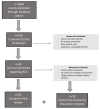Breast Cancer Diet "BCD": A Review of Healthy Dietary Patterns to Prevent Breast Cancer Recurrence and Reduce Mortality
- PMID: 35276833
- PMCID: PMC8839871
- DOI: 10.3390/nu14030476
Breast Cancer Diet "BCD": A Review of Healthy Dietary Patterns to Prevent Breast Cancer Recurrence and Reduce Mortality
Abstract
Breast cancer (BC) represents the most common cancer in women, while overweight and obesity are the second preventable cause of cancer. Weight gain and fat accumulation are common after BC diagnosis; moreover, weight gain during the treatment decreases the survival rate and increases the risk of recurrence in breast cancer survivors (BCS). To reduce the risk of second primary cancer or BC recurrence, and all-cause mortality in BCS, multiple interventions have been investigated to obtain reduction in weight, BMI and/or waist circumference. The aim of this narrative review is to analyze evidence on BCS for their risk of recurrence or mortality related to increased weight or fat deposition, and the effects of interventions with healthy dietary patterns to achieve a proper weight and to reduce fat-related risk. The primary focus was on dietary patterns instead of single nutrients and supplements, as the purpose was to investigate on secondary prevention in women free from disease at the end of their cancer treatment. In addition, BC relation with insulin resistance, dietary carbohydrate, and glycemic index/glycemic load is discussed. In conclusion, obesity and overweight, low rates of physical activity, and hormone receptor-status are associated with poorer BC-treatment outcomes. To date, there is a lack of evidence to suggest which dietary pattern is the best approach for weight management in BCS. In the future, multimodal lifestyle interventions with dietary, physical activity and psychological support after BC diagnosis should be studied with the aim of reducing the risk of BC recurrence or mortality.
Keywords: breast cancer (BC); breast cancer survival; healthy dietary patterns; secondary prevention.
Conflict of interest statement
The authors declare no conflict of interest.
Figures


References
-
- World Cancer Research Fund/American Institute for Cancer Research Continuous Update Project Expert Report 2018. Diet, Nutrition, Physical Activity and Breast Cancer. [(accessed on 25 November 2021)]. Available online: dietandcancerreport.org.
-
- Barone I., Giordano C., Bonofiglio D., Ando S., Catalano S. Seminars in Cancer Biology. Academic Press; Cambridge, MA, USA: 2019. The weight of obesity in breast cancer progression and metastasis: Clinical and molecular perspectives. - PubMed
-
- Iyengar N.M., Arthur R., Manson J.E., Chlebowski R.T., Kroenke C.H., Peterson L., Cheng T.-Y.D., Feliciano E.C., Lane D., Luo J., et al. Association of Body Fat and Risk of Breast Cancer in Postmenopausal Women with Normal Body Mass Index. JAMA Oncol. 2019;5:155–163. doi: 10.1001/jamaoncol.2018.5327. - DOI - PMC - PubMed
Publication types
MeSH terms
LinkOut - more resources
Full Text Sources
Medical

